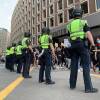It’s been easy to miss, what with a surging pandemic and surreal presidential election, but next year’s Boston mayoral race is already underway.
Two city councilors,
Michelle Wu
The race features a strange dynamic. The election could be historic, since Boston has never had a female mayor or a mayor of color. But with two candidates, not just one, capable of breaking those barriers, the chance to be a trailblazer isn’t distinctive — at least, not yet.
So recently, GBH News asked both Campbell and Wu: For voters who want an alternative to Marty Walsh, what sets you apart?
“My work has always been grounded in … my personal story,” Campbell said. “I got into politics and being a public servant after losing my twin brother Andre, who I talk about all the time, who is near and dear to me.”
Andre Campbell died at 29, while being held in pre-trial detention by the Massachusetts Department of Correction. For Campbell, his fate embodies a system that allows some Bostonians to thrive, while grinding others down.
“I’m always focused on dismantling systems that perpetuate inequities, and using my story as an example … of a girl who grew up in the city of Boston, who was a [Boston Public Schools] kid, that understands these inequities not just from an academic perspective, but [has] lived them,” Campbell said.
Tying politics to biography could distinguish Campbell from Walsh, who has own very different set of Boston experiences — including growing up Irish Catholic and battling alcoholism — and also from Wu, who went to high school in Illinois, and moved to Massachusetts to attend Harvard College.
When Wu was asked to contrast herself to Campbell, she had a very different response.
“Well, first, I would challenge the frame that there’s a spot for the mayor, and then a spot for someone else who’s not the mayor,” Wu said. “I think that’s a very tired way of looking at things, that in fact doesn’t reflect the hopefulness and the optimism that people have on the ground for what we could be as a city.
“Boston is not reaching our potential,” Wu added. “And this race is not is about the leadership of one single person in that conversation … and what their specific background or identity or experiences are, that makes them the best able to make an individual decision about what should happen. ... It is very much about who is ready and able to be a platform for every person in Boston to see themselves having a role in shaping the future of our city.”
In other words, nearly three months into the campaign, Campbell and Wu are defining themselves very differently. Campbell is the native daughter of Boston who can reckon with the city’s challenges because she’s lived with them firsthand for decades. Wu is the populist visionary who rejects conventional political wisdom and sees herself as a conduit for change.
If you’re hearing these pitches for the first time, rest assured: a lot of other people probably are, too.
Both Wu and Campbell say that because of national politics and the pandemic, their campaigns started differently than they might have in a more ordinary, less overwhelming year.
“Of course, during the presidential election, there’s been an extra layer of complication,” Wu said.
Wu responded to this, in part, by turning her weekly campaign meet-ups — a.k.a “Wu Wednesdays” — into phone banks for candidates in other races, in Massachusetts and elsewhere. And Campbell says the tenor of her launch was muted to reflect the fraught moment we’re in.
“When we were planning our announcement, and what that would look like, we probably would have had it be bigger, and included more people, including many of my civic leaders and residents in my district,” Campbell said. “But because of COVID, because of the guidelines and precautions we all should be taking, we had to tone that down.
“We had to tone down even the message,” she added. “We might have wanted to say more, but we wanted to be mindful of the fact that people are still suffering in many ways.”
Still, both candidates have been campaigning in earnest. They’ve introduced themselves to voters in virtual or socially distant settings; rolled out endorsements (Wu has been backed by former Democratic gubernatorial candidate Jay Gonzalez, Campbell by former Suffolk County Sheriff Andrea Cabral); and asked supporters for money they’ll need to reach the mayor’s office.
Walsh has been fundraising in earnest, too, even though he’s still not officially in the race. Case in point: a recent, virtual “Women For Walsh” event at which the mayor raised more than $100,000.
During that event, attendees watched a slick
video
“At the New England Women’s Leadership Awards, there was a woman that was with the mayor, and she was a woman of color, so that really stuck with me,” a young Black woman said at one point. “Because that’s women of color helping people that are running a whole city. Just really inspiring. Really touching.”
That fundraiser is one of several indications Walsh is highly likely to seek a third term. Since mid-September, Walsh has raised more than $700,000, leaving him with nearly $6 million cash on hand, according to the Massachusetts Office of Campaign and Political Finance. (Wu and Campbell currently have less than $500,000 each.)
Walsh has also publicly downplayed the idea of a post in the Biden administration. GBH News has spoken with multiple individuals who say the mayor has told them he is planning to run again.
If he does, that will mean a preliminary election for him, Wu and Campbell next September — with the top two finishers, whoever they are, advancing to a November final.





